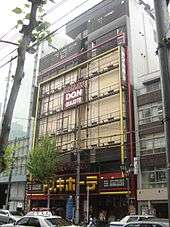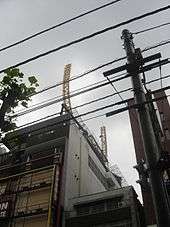Don Quijote (store)
|
| |
| Public (TYO: 7532) | |
| Industry | Retail |
| Founded | September 5, 1980 (Tokyo, Japan) |
| Headquarters | Meguro, Tokyo |
Number of locations | 163 stores (February 2011) |
Area served | Japan, Hawaii, Singapore |
| Products | Clothing, food, jewelry, housewares, tools, sporting goods and electronics. |
| Revenue |
|
|
| |
|
| |
| Total assets |
|
| Total equity |
|
Number of employees | 4,391 |
| Website |
donki |
Don Quijote (ドン・キホーテ Don Kihōte) is a discount chain store that has over 160 locations throughout Japan, three stores in Hawaii and two in Singapore (branded as Don Don Donki).[2][3] It carries a wide range of products, from basic groceries to electronics to clothing. The store is well known in Japan and is often referred to by its shortened name Donki (ドンキ). Distinctly, Don Quijote tends to keep very late hours for Japanese retailing (to 3 or 5am, or even 24 hours) and it packs its goods from ceiling to floor in a distinct merchandising strategy.
History

Don Quijote opened its first store in Suginami, Tokyo in September 1980 under its original name, Just Co. Originally a retail store, Just Co. quickly switched to wholesale in 1982.
The company opened its first "Don Quijote" named store in Fuchu, Tokyo in March 1989. With the name change, the store also changed its primary business from wholesale to retail. It was not until 1995, six years later, that Just Co. followed suit and it changed its corporate name to Don Quijote Co., Ltd as well. In June 1998, the company was listed on the Tokyo Stock Exchange.[3]
As one of the few discount stores in Japan, the end of the Japanese economic bubble did not have disastrous effects for Don Quijote. Instead, the sudden economic uncertainty caused the Japanese public to become more thrifty and therefore helped to boost sales at its stores during the early 1990s.
In 2005, idol group AKB48 opened its theater on the eighth floor of the Don Quijote Akihabara Outlet in Tokyo.[4]
In 2007, Don Quijote purchased ailing Nagasakiya for 140 billion yen. This store and 3 other group companies went defunct in Oct 2017 as creditors have pulled the plug on their combined 432 billion yen of debts.[5] Creditors continue to bankroll the rest of the group.
In 2013, Don Quijote purchased Marukai Corporation U.S.A. including stores in Hawaii and California.[6]
On June 28, 2017, PAQ, which operated Honolulu, Hawaii-based Times, Big Save, and Shima's under the subsidiary QSI, Inc., announced that it has sold the 24 stores it owns in Hawaii to Honolulu-based Don Quijote (USA), using an executed a stock purchase agreement with the sale closing in the 3rd quarter of 2017. The deal will combine Times with three Don Quijote stores and two Marukai stores on Oahu. In a statement from Edwin Sawai, president of Don Quijote (USA) Co., Ltd. and Marukai Hawaii Co. Ltd., “The opportunity to welcome the Times Supermarket family of stores and their employees to our ohana is exciting for us,” and added that “We are confident that we will successfully work together, share ideas and learn from each other’s combined experiences to best serve Hawaii. For more than 68 years, Times Supermarket has been a local favorite and pillar of Hawaii’s retail community. We look forward to continuing their history and success in the islands.”[7]
Don Quijote opened its first Southeast Asian and Singapore store at Orchard Central on December 1, 2017.[8][9][10] It then opened a second store at the 100AM Mall in Tanjong Pagar on June 14, 2017.[11] Don Quijote plans to have 5 stores in Singapore by the end of 2019 and 10 stores at the end of 2020.[12] In contrast to the wide variety of products and store formats in Japan, such as Picasso, Mega Don Quijote, and high-end product store Platinum Don Quijote, Singapore Don Don Donki locations primarily stock food and drink items.[13]
Theme song
Don Quijote is known for the distinctive song that plays in its stores. The song is called "Miracle Shopping" (ミラクルショッピング Mirakurushoppingu) sung by Maimi Tanaka (田中マイミ Tanaka Maimi), a Don Quijote store employee.[14] "Miracle Shopping" was released as a maxi single in 1999.[15]
Controversy

Arson
In December 2004, four stores in the Kantō area were damaged or destroyed by arson attacks. Three store employees, Morio Oshima, 39, Mai Koishi, 20, and Maiko Sekiguchi, 19, died in the first arson incident. In 2007, Noriko Watanabe, 49, was found guilty of setting the fires and sentenced to life imprisonment. Don Quijote received harsh criticism at the time for poor store layout that made it difficult to find exits.[16]
Roller coaster
In 2005, Don Quijote began building a "half-pipe" roller coaster on the roof of its eight-story Roppongi store. Roppongi is a heavily populated area in the core of Tokyo, and many residents and businesses were upset with the idea of having a roller coaster in their neighborhood because of the spectacle, noise and crowds it will likely create. The project was completed in 2006 but due to increasing pressure from concerned groups in the area it has never been operated. As of 2016, the structure still exists. Don Quijote has not announced what future plans they have for it.[17]
Overseas assets
Don Quijote purchased the Marukai Japanese chain stores in the United States in 2013, splitting it into Marukai and Tokyo Central Markets chains.[18]
References
- 1 2 3 4 5 "Shared Research report - Don Quijote".
- ↑ "Don Quijote founder and his ties to Singapore". AsiaOne. Retrieved 2017-11-29.
- 1 2 "Corporate History". Archived from the original on 2008-03-13. Retrieved 2008-03-19.
- ↑ "Girl idol group about mass exposure, fans". The Japan Times Inc. The Japan Times. August 24, 2010. Retrieved June 29, 2011.
- ↑ "Collapse of debt-ridden Nagasakiya signals the end of a tradition - IOL Business Report".
- ↑ All 11 Marukai Stores to Be Sold – Rafu Shimpo. Rafu.com (2013-09-04). Retrieved on 2014-05-24.
- ↑ "Don Quijote acquires Hawaii-based Times Supermarkets" from Pacific Business Journal (June 28, 2017)
- ↑ "Japan's Donki to open first Southeast Asian store in Singapore". Channel NewsAsia. Retrieved 2018-08-07.
- ↑ Varma, Ankita (2017-11-30). "Don Don Donki store opening at Orchard Central on Friday". The Straits Times. Retrieved 2018-08-07.
- ↑ "Japan's Donki to launch second outlet in Singapore, first store set for Dec 1 opening". Channel NewsAsia. Retrieved 2018-08-07.
- ↑ Ng, Charmaine (2018-06-05). "Don Don Donki opening second outlet at 100AM in Tanjong Pagar on June 14". The Straits Times. Retrieved 2018-08-07.
- ↑ "Japan's Don Don Donki targets 10 stores in Singapore by 2020". Channel NewsAsia. Retrieved 2018-08-07.
- ↑ "Don Quijote rides high on rule-breaking reputation". Asahi Shimbun. August 14, 2018. Retrieved August 16, 2018.
- ↑ Takachandesu (12 January 2008). "ドンキ・ホーテのテーマ♪ミラクルショッピング" – via YouTube.
- ↑ "田中マイミのプロフィール".
- ↑ "Don Quijote store arsonist gets life for three deaths". The Japan Times. 2007-03-24. Retrieved 2008-03-19.
- ↑ "ドン・キホーテ六本木店絶叫マシン建設計画断念!".
- ↑ "All 11 Marukai Stores to Be Sold". www.rafu.com.
External links
| Wikimedia Commons has media related to Don Quijote (company). |
Coordinates: 35°39′44.73″N 139°44′5.11″E / 35.6624250°N 139.7347528°E